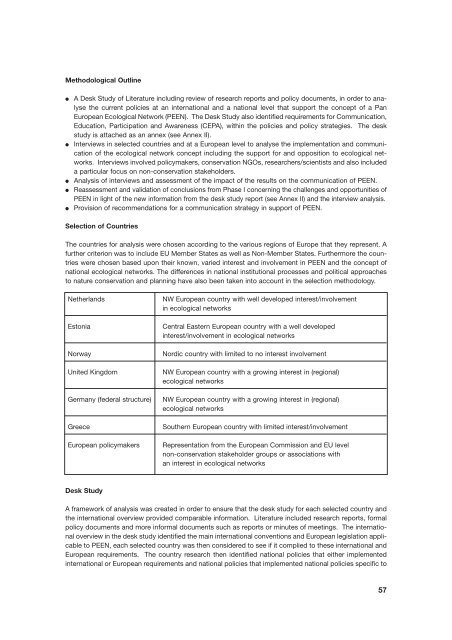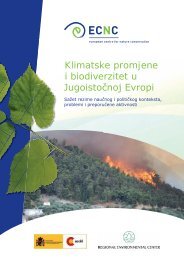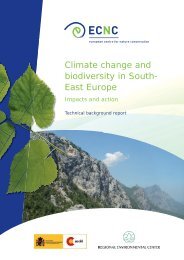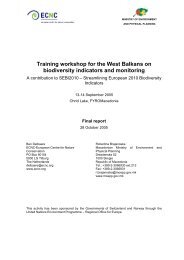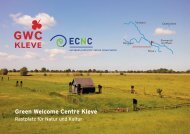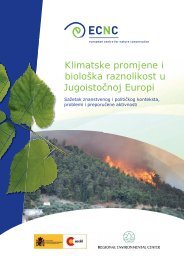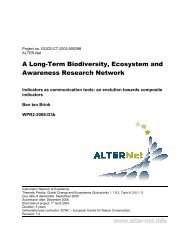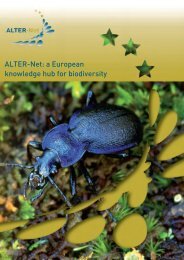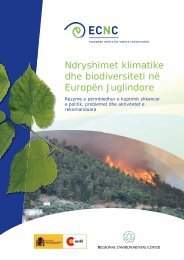2005 - Communicating the Pan-European Ecological Network - ECNC
2005 - Communicating the Pan-European Ecological Network - ECNC
2005 - Communicating the Pan-European Ecological Network - ECNC
Create successful ePaper yourself
Turn your PDF publications into a flip-book with our unique Google optimized e-Paper software.
Methodological Outline●●●●●A Desk Study of Literature including review of research reports and policy documents, in order to analyse<strong>the</strong> current policies at an international and a national level that support <strong>the</strong> concept of a <strong>Pan</strong><strong>European</strong> <strong>Ecological</strong> <strong>Network</strong> (PEEN). The Desk Study also identified requirements for Communication,Education, Participation and Awareness (CEPA), within <strong>the</strong> policies and policy strategies. The deskstudy is attached as an annex (see Annex II).Interviews in selected countries and at a <strong>European</strong> level to analyse <strong>the</strong> implementation and communicationof <strong>the</strong> ecological network concept including <strong>the</strong> support for and opposition to ecological networks.Interviews involved policymakers, conservation NGOs, researchers/scientists and also includeda particular focus on non-conservation stakeholders.Analysis of interviews and assessment of <strong>the</strong> impact of <strong>the</strong> results on <strong>the</strong> communication of PEEN.Reassessment and validation of conclusions from Phase I concerning <strong>the</strong> challenges and opportunities ofPEEN in light of <strong>the</strong> new information from <strong>the</strong> desk study report (see Annex II) and <strong>the</strong> interview analysis.Provision of recommendations for a communication strategy in support of PEEN.Selection of CountriesThe countries for analysis were chosen according to <strong>the</strong> various regions of Europe that <strong>the</strong>y represent. Afur<strong>the</strong>r criterion was to include EU Member States as well as Non-Member States. Fur<strong>the</strong>rmore <strong>the</strong> countrieswere chosen based upon <strong>the</strong>ir known, varied interest and involvement in PEEN and <strong>the</strong> concept ofnational ecological networks. The differences in national institutional processes and political approachesto nature conservation and planning have also been taken into account in <strong>the</strong> selection methodology.Ne<strong>the</strong>rlandsEstoniaNorwayUnited KingdomGermany (federal structure)Greece<strong>European</strong> policymakersNW <strong>European</strong> country with well developed interest/involvementin ecological networksCentral Eastern <strong>European</strong> country with a well developedinterest/involvement in ecological networksNordic country with limited to no interest involvementNW <strong>European</strong> country with a growing interest in (regional)ecological networksNW <strong>European</strong> country with a growing interest in (regional)ecological networksSou<strong>the</strong>rn <strong>European</strong> country with limited interest/involvementRepresentation from <strong>the</strong> <strong>European</strong> Commission and EU levelnon-conservation stakeholder groups or associations withan interest in ecological networksDesk StudyA framework of analysis was created in order to ensure that <strong>the</strong> desk study for each selected country and<strong>the</strong> international overview provided comparable information. Literature included research reports, formalpolicy documents and more informal documents such as reports or minutes of meetings. The internationaloverview in <strong>the</strong> desk study identified <strong>the</strong> main international conventions and <strong>European</strong> legislation applicableto PEEN, each selected country was <strong>the</strong>n considered to see if it complied to <strong>the</strong>se international and<strong>European</strong> requirements. The country research <strong>the</strong>n identified national policies that ei<strong>the</strong>r implementedinternational or <strong>European</strong> requirements and national policies that implemented national policies specific to57


